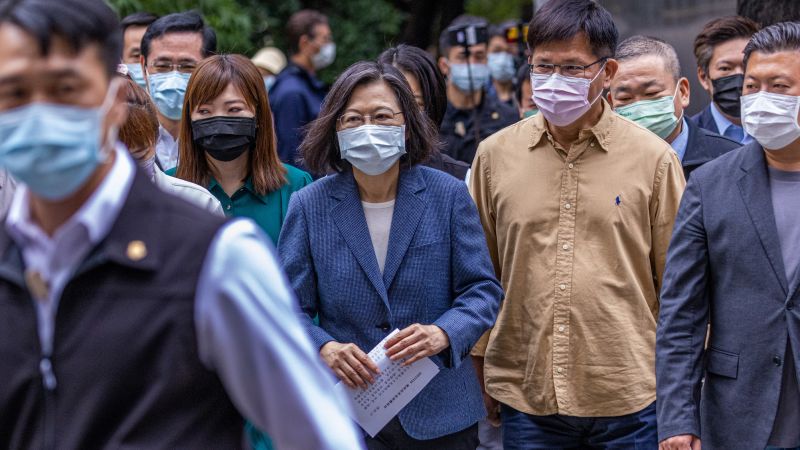

Tainan, Taiwan
CNN
—
Taiwan’s President Tsai Ing-wen has resigned as the leader of the island’s ruling Democratic Progressive Party, after her party suffered heavy losses in mid-term elections.
The DPP’s losses in Saturday’s vote come as a heavy blow for Tsai as she had tried to frame the election – technically a local affair to choose city mayors, councilors and county chiefs – as a way to send a message against Beijing’s rising bellicosity toward the island.
Beijing has been increasingly assertive in its territorial claims over Taiwan in recent months, and in August launched large-scale military exercises around the island in response to a controversial visit by US House Speaker Nancy Pelosi.
But Tsai’s appeal to link the issues appears to have done little to boost the fortunes of her party, which is often outperformed by the opposition Kuomintang (KMT) party in local ballots.
The KMT – which is widely seen as friendlier to Beijing and advocates greater economic ties with mainland China – is expected to win mayoral elections in 13 counties, according to Taiwan’s official Central News Agency. Tsai’s party, by comparison, is expected to win only five – one fewer than in the last local election.
“We humbly accept the results of the election and the decision of the people of Taiwan,” Tsai wrote on Facebook on Saturday night.
She added that she had already resigned as party chief to “fully bear the responsibilities”.
However, Tsai will remain as President. Her presidential term ends in 2024,
The result comes despite escalating rhetoric from Beijing. China’s leader Xi Jinping told a Communist Party meeting last month that “the wheels of history are rolling on towards China’s reunification” and that Beijing would never renounce the use of force to take Taiwan.
Analysts said the result showed voters were more focused on domestic issues like the economy and social welfare.
“Taiwanese voters have become desensitized to China’s military threat. And hence there isn’t quite as much of a perceived urgency to making the issue of survival front and center,” said Wen-ti Sung, a political scientist with the Australia National University’s Taiwan Studies Program.
“The DPP’s China threat card is facing diminishing marginal returns over time.”
That assessment tallied with the thoughts of voter Liao Su-han, an art curator from the central Nantou county who cast a ballot for the DPP but said Beijing’s recent actions were not a major factor in deciding her vote.
“China’s military threat has always been there, and it did not just begin this year,” she said.
“As Taiwanese, we are pretty used to China’s rhetoric that they want to invade us all the time, so [it] did not have a big impact on who I’m voting for.”
Eric Su, a 30-year-old account manager who lives in New Taipei City, said while he voted for Tsai in the presidential election, he supported a KMT candidate because they are stronger on local issues.
“In a presidential election, I consider more about global issues, because a president can influence our economy and international standing,” he said.
“In a mayoral election, I care more about what a candidate can bring to local residents, such as infrastructure planning and child subsidies.”
The KMT, also known as the Chinese Nationalist Party, ruled over China between 1912 and 1949, when it retreated to Taiwan after losing a civil war to the Chinese Communist Party.
The KMT set up its own government on the island – having taken control of it from Japan after the second world war – while the Communist Party took control of mainland China. Ever since, the Communist Party has harbored ambitions of “reunification” with Taiwan – by force, if necessary.
When the KMT first fled to Taiwan, its then-president Chiang Kai-shek ruled the island with an iron fist and implemented decades of martial law to crack down on political dissent.
After decades of struggle by pro-democracy campaigners, Taiwan was gradually transformed from authoritarian rule into a democracy, and it held the first direct presidential election in 1996.
The KMT is now widely seen as friendlier to Beijing than the ruling DPP, and it accepts a so-called “1992 consensus”, a tacit understanding that both Taipei and Beijing acknowledge they belong to “one China”, but with different interpretations of what that entails.
Tsai, on the other hand, has refused to acknowledge the consensus. The position of her DPP is to defend Taiwan’s status quo as an independent government and expand its international space against an increasingly assertive Beijing.
Among the more notable victories in Friday’s mayoral races was that of Chiang Wan-an – the great-grandson of Chiang Kai-shek. He will become the next mayor of Taipei after beating the DPP’s Chen Shih-chung, who served as Taiwan’s health minister during the Covid-19 pandemic.
In a statement on Saturday night, China’s Taiwan Affairs Office said the election results showed that most people in Taiwan valued “peace, stability and a good life”. It said Beijing will continue to “firmly oppose Taiwan independence and foreign interference.”
However, experts said the KMT’s victory did not necessarily reflect a shift in how Taiwan’s public viewed their relationship with mainland China.
“The election was voted on bread-and-butter issues, and I disagree that it signals a major impact on Taiwan’s cross-strait policies,” said J. Michael Cole, a Taipei-based senior adviser for International Republican Institute.
“The outcome of this election is not reflective of what voters will be looking for in choosing the next president.”
Sung at Australia National University said it was too early to speculate over the KMT’s chances of winning the next presidential election in 2024, but felt this result had given it a boost.
“The KMT is now better positioned to be the (party) that unifies the opposition and attracts all the anti-status quo protest votes against the current administration,” he said.
